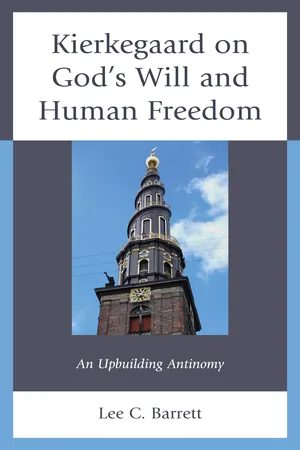
- English
- ePUB (mobile friendly)
- Available on iOS & Android
eBook - ePub
About this book
Søren Kierkegaard's authorship exhibits two different trajectories concerning the relation of responsible human agency to sovereign divine agency: one trajectory stresses free human striving, while the other trajectory emphasizes the dominance of divine agency. The first theme led to the view of Kierkegaard as the champion of autonomous existential "leaps," while the second led to the construal of Kierkegaard as a devout Lutheran who trusted absolutely in God's gracious governance. Lee C. Barrett argues that Kierkegaard, influenced by Kant's critique of metaphysics, did not attempt to integrate human and divine agencies in any speculative theory. Instead, Kierkegaard deploys them to encourage different passions and dispositions that can be integrated in a coherent human life, making use of literary strategies to foster the different passions and dispositions that are associated with the themes of human responsibility and divine governance. Kierkegaard on God's Will and Human Freedom: An Upbuilding Antinomy offers an incisive account of what makes Kierkegaard's conception of theology as a matter of edification rather than speculation so distinctive and enduringly worthwhile.
Frequently asked questions
Yes, you can cancel anytime from the Subscription tab in your account settings on the Perlego website. Your subscription will stay active until the end of your current billing period. Learn how to cancel your subscription.
No, books cannot be downloaded as external files, such as PDFs, for use outside of Perlego. However, you can download books within the Perlego app for offline reading on mobile or tablet. Learn more here.
Perlego offers two plans: Essential and Complete
- Essential is ideal for learners and professionals who enjoy exploring a wide range of subjects. Access the Essential Library with 800,000+ trusted titles and best-sellers across business, personal growth, and the humanities. Includes unlimited reading time and Standard Read Aloud voice.
- Complete: Perfect for advanced learners and researchers needing full, unrestricted access. Unlock 1.4M+ books across hundreds of subjects, including academic and specialized titles. The Complete Plan also includes advanced features like Premium Read Aloud and Research Assistant.
We are an online textbook subscription service, where you can get access to an entire online library for less than the price of a single book per month. With over 1 million books across 1000+ topics, we’ve got you covered! Learn more here.
Look out for the read-aloud symbol on your next book to see if you can listen to it. The read-aloud tool reads text aloud for you, highlighting the text as it is being read. You can pause it, speed it up and slow it down. Learn more here.
Yes! You can use the Perlego app on both iOS or Android devices to read anytime, anywhere — even offline. Perfect for commutes or when you’re on the go.
Please note we cannot support devices running on iOS 13 and Android 7 or earlier. Learn more about using the app.
Please note we cannot support devices running on iOS 13 and Android 7 or earlier. Learn more about using the app.
Yes, you can access Kierkegaard on God’s Will and Human Freedom by Lee C. Barrett in PDF and/or ePUB format, as well as other popular books in Philosophy & Free Will & Determinism in Philosophy. We have over one million books available in our catalogue for you to explore.
Information
Table of contents
- Cover
- Half Title
- Contents
- Preface
- Acknowledgments
- Sigla for Kierkegaard’s Works
- Introduction: Kierkegaard and the Tensive Virtues of Resting in God’s Governance and Striving for Eternal Happiness
- Chapter One: Kierkegaard’s Contentious Philosophical Background
- Chapter Two: Kierkegaard’s Tensive Theological Background
- Chapter Three: Kierkegaard and the Later Grace/Free-Will Debates
- Chapter Four: Kierkegaard’s Unconventional Practice of Theology
- Chapter Five: Active Leaping and Gracious Receiving in Philosophical Fragments
- Chapter Six: Concluding Unscientific Postscript and the Truth and Untruth of Subjectivity
- Chapter Seven: The Upbuilding Discourses and the Art of Being Nothing while Being Something
- Chapter Eight: Preparing for Communion and the Impossibility of Preparing for Communion
- Chapter Nine: Authorial Intentions and Divine Governance
- Chapter Ten: Repentance Interrupted by Birds, Lilies, and Little Ludvig
- Conclusion
- Bibliography
- About the Author